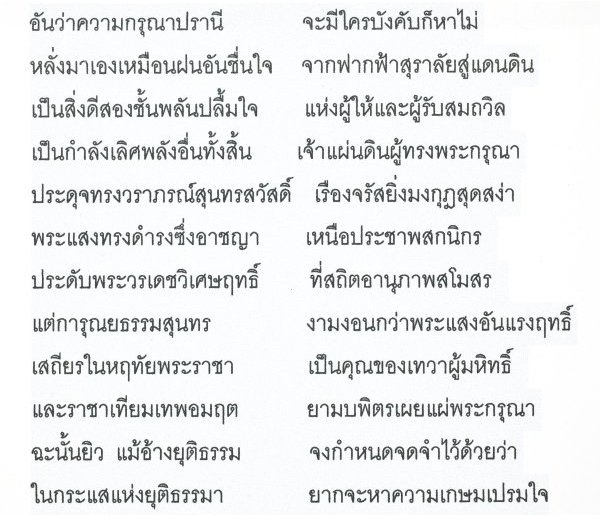In this video, Kanlaya Coulsting chose to read Portia's "The quality of mercy" speech in Thai, translated by King Rama VI. In her blog she explains what drew her to that particular passage from The Merchant of Venice.

Image: "The quality of mercy" in Thai
I chose to read this extract because I think it reflects the kindness of King Rama VI as an incident in Thai history demonstrates. In 1912, a group of army officers plotted to overthrow the King to turn Thailand from absolute monarchy to either constitutional monarchy or a republic. However, the attempted uprising failed and the plotters were tried by a military tribunal. The leaders were sentenced to death; others to life imprisonment, and shorter sentences. Despite the seriousness of their crimes, most of the plotters were pardoned or had their sentences reduced by the King himself in 1924. This included the death sentences. I find this is the finest example of the King showing mercy and forgiveness to others - just like in Portia's famous speech.

King Rama VI, also known as King Vajiravudh or King of Siam (now Thailand), was born on 1 January 1881 and died 26 November 1925. He read history and law at the University of Oxford and succeeded his father King Rama V in 1910. King Rama VI was noted for his progressive reforms and was also a prolific writer and translator, and showed talent for writing prose as well as poetry. In addition, he wrote plays, using various pen names, and often acted in plays himself. He adapted more than a hundred plays by English and French writers and translated three of Shakespeare's plays into Thai, including The merchant of Venice, As You Like It and Romeo and Juliet. The translated versions are written in a poetic style, so beautifully written that one of them, The merchant of Venice, has become part of the secondary school curriculum. An extract from The merchant of Venice, based on a translation by King Rama VI, was adapted into a popular song called Love - watch the video below to listen to the song.
